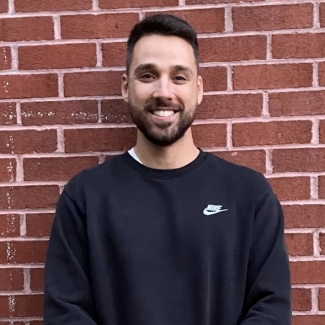If there’s a common thread that has guided Theo Tabah, BComm 13, throughout his career so far, it’s the importance of building community. While studying marketing at the John Molson School of Business, he learned the value of collaborating, connecting with people and navigating group dynamics.
“That’s what Concordia offered,” Tabah says. “During those moments in class and studying for exams, we felt community, we felt belonging. We felt like we were on a shared mission.”
He now hopes to carry those values into the tech industry as co-founder and chief operating officer (COO) of Late Checkout, a community-based product-design agency.
“We want to connect the disconnected, because despite the promise of increased ability to connect via technology, people are more disconnected than ever before,” says Tabah, who launched the agency with CEO Greg Isenberg in 2020.
Late Checkout helps brands from Dropbox to Reddit move from mass appeal to “community appeal” and consults on how they can design winning products for the future and cater to underserved communities. By pairing the latest technology with a focus on community immersion, the agency provides assistance from the research and analysis phase to design, prototyping and engineering.
The COVID-19 pandemic had just hit when Late Checkout launched, moving work meetings online and altering the global economy. And while many businesses struggled with the new challenges, the pandemic presented an opportunity for the agency to position itself as a leader in responding to change.
“Whenever there’s a monumental shift in how the world works and how things operate, people tend to look for outside expertise to help them navigate that,” says Tabah. “When so much was changing, we were a great place for answers.”
Originally comprised of an agency, a studio and a fund, Late Checkout evolved into a holding company for businesses that develop community-based products. The Late Checkout Agency (LCA) is now one of the companies under the holding company.
A seed planted at Concordia
Tabah credits his time — and the people he met — at Concordia as pivotal to his current success.
The defining moment happened during an entrepreneurship class taught by course lecturer Herman Tumurcuoglu, BComm 95. Students were pitching business ideas to a panel, and Tabah noticed the guest judge had great ideas about business innovation. It was his current business partner, Greg Isenberg.
“I asked myself, ‘Why is this guy, who’s the same age as everyone in this class, judging us and not up here pitching?” Tabah recalls.
It was the dawn of social media, and Tabah sent Isenberg a message on Twitter (now X) expressing his interest in collaborating. While still studying at John Molson, Tabah joined Isenberg as an intern, which evolved into a multifaceted, paid role. After graduation, Tabah moved to the San Francisco Bay Area to learn the ropes of the tech industry. He reconnected with Isenberg reconnected in 2020, and the rest is history.
Filling a void
The tech space is often dominated by “solopreneurs” and content creators, who generally work alone. As technology continues to drive loneliness post-pandemic, Tabah and Late Checkout want to change the narrative.
“As more people take these solo routes, I think they are going to realize that money and likes are not going to fill the void of lack of community and belonging,” he says.
Tabah maintains that community is good for business. If a company builds a product focused on belonging, shared missions and self-expression, it can create a movement that brings people together — and boost sales, he adds.
Thanks to artificial intelligence, the barrier to entry is lower than ever when it comes to starting a business. Even if low prices and convenience will always be appealing to consumers, Tabah believes the ways established “big tech” and legacy brands are operating won’t work in the future because people crave something to belong to and stand for.
“Tech fundamentally needs to change from software and online-only to thinking about how to shape products that connect people,” he says, adding that he remains grateful to Concordia for providing him with the foundation of exactly what has brought him his own success: community.
 “Whenever there’s a monumental shift in how the world works and how things operate, people tend to look for outside expertise to help them navigate that,” says Theo Tabah.
“Whenever there’s a monumental shift in how the world works and how things operate, people tend to look for outside expertise to help them navigate that,” says Theo Tabah.